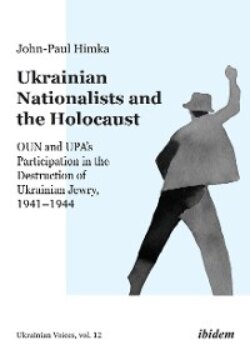Читать книгу Ukrainian Nationalists and the Holocaust - John-Paul Himka - Страница 23
Ukrainian Accounts
ОглавлениеI have made every effort to consult as many relevant accounts by Ukrainians as I could, but for the most part, Ukrainian memoirs avoid the topic of the Holocaust. Shmuel Spector wrote of them: “...quite a few of the Ukrainians who after the war fled to the countries of Western Europe had collaborated with the Nazis, including active participation in the murder of Jews, either as policemen or as officials of the Nazi administration. Their memoirs and articles written after the war ignore completely the Jewish issue. There are even individuals seeking to present the authors of these memoirs as those who had saved Jews or helped them in their predicament.”80 This is too all-encompassing a generalization, but it does represent the bulk of what the historian finds in Ukrainian memoirs.
The Oseredok Ukrainian Cultural and Education Centre in Winnipeg held a memoir contest in 1947, which resulted in the submission of 64 memoirs. Not all are extant, but of those that are, 25 concerned the World-War-II period; of these, 14 mentioned, at least briefly, the Holocaust. As I wrote in the abstract to my published analysis of them:
This body of memoirs is the earliest collection of Ukrainian memoirs of World War II that I am aware of, the closest in time to the events of the Holocaust. Already then, however, Ukrainians had become quite defensive about their behaviour towards the Jews; this perhaps explains why close to half the memoirs about the war omitted the fate of the Jews altogether and why the memoirs that do mention the Holocaust say almost nothing about Ukrainian involvement. The memoirists did, however, reproduce the image of Jews as agents of communism, particularly active in the organs of repression. The majority of the 1947 memoirs nonetheless indicated horror at and disapproval of the murder of the Jews by the Germans. Perhaps characteristically, the account expressing the strongest such feelings was written by an older man from outside Western Ukraine. Conversely, the most outright expression of lack of sympathy with the Jews came from a man twelve years younger and from Galicia.81
I have examined carefully many of the memoirs of World War II collected by the Ukrainian Canadian Research and Documentation Centre (UCRDC) in Toronto.82 This is an institution with a generally nationalist perspective, emphasizing Ukrainian victimhood and Ukrainian rescue efforts during the Holocaust and maintaining silence about Ukrainian perpetration.83 Among items to be found here are the memoirs of a member of the Ukrainian Auxiliary Police; they are several hundred pages long and do not once mention the Holocaust.84 Still, the memoirs provide information and context that have been useful for this study.
In May and June 2009 my daughter Eva Himka conducted interviews for me with twenty elderly nationalists in Lviv. They denied any Ukrainian involvement in the Holocaust at all, saying that Ukrainians uniformly sympathized with the Jews and only Germans and Poles killed Jews. The Ukrainian police were harmless and patriotic. UPA did not kill Jews and only fought a defensive war against the Poles. In their view, their own suffering, personal and national, at the hands of the Soviets was a more important story than what happened to the Jews. They still viewed Jews as communists and exploiters who inflicted the famine of 1932-33, the Holodomor, on the Ukrainian people.85
A major project of gathering Ukrainian testimonies has been undertaken by Father Patrick Desbois and his institution Yahad-In Unum founded in 2004. His team has been crisscrossing Ukraine to videotape eyewitnesses to the murder of the Jews. In Galicia the eyewitnesses they contacted were sometimes nationalists, e.g., one was a member of the Melnyk faction in Lviv,86 another was a member of the Bandera group and had been his village’s liaison with OUN,87 and another was a member of the village administration set up by OUN (he ran the post office).88 But there were also testimonies from Galicia and Volhynia that described events from a more neutral perspective and sometimes mentioned Ukrainian participation in killings. Testimonies from the territory of pre-1939 Soviet Ukraine are much more forthcoming about how the local population was drawn into the killing process. The USC Shoah Foundation also took some testimony from Ukrainian rescuers.89
Interesting texts that described the Holocaust in Lviv were written by Mariia Strutynska during and just after the war. One was the diary she began on 10 August 1941 and continued until 22 December 1949,90 and another was a novel that she wrote in 1947 that was set during the first Soviet occupation of Galicia in 1939-41 and the first days of the German occupation.91
Unique among the Ukrainian ego-documents on the Holocaust is Yevhen Nakonechny’s memoir of the “Shoah in Lviv.”92 Beautifully written, it described the destruction of Lviv’s Jews from the point of view of a child, which Nakonechny had been at the time. His childhood friends and neighbors, who were Jewish, perished in the Holocaust. He wrote with great sympathy for the victims. At the same time, he denied Ukrainian participation in these murders and excoriated “Ukrainophobes,” such as the historian Eliyahu Yones, who thought otherwise. Nakonechny himself had been arrested as a member of an OUN youth group in 1949, at the age of seventeen, and he spent the next six years in the gulag. In his memoir he defended the innocence of OUN, even denying its antisemitism. It is a strange, but captivating book.93
